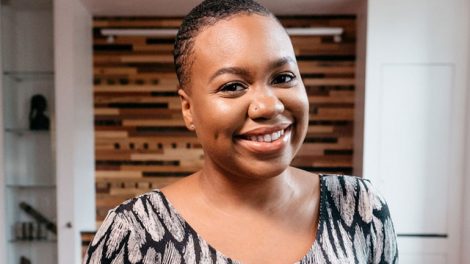
Jan 26, 2018
The Power of Connections
In her day job managing external communications from the New York office of Andela, an African tech startup, Dami Oye ’15 is able to merge her love for…
By Jill Spotz
When Kai Nielsen ’11 graduated from Lafayette College, his subsequent visits back home to St. Croix were eye-opening. He began to watch the place he loved “slowly take a nosedive.” In 2012, Hovensa, the large oil refinery located on the island, closed after experiencing several years of losses. By 2013, the U.S. Virgin Islands Bureau of Economic Research had calculated that the refinery closure caused “an annual decline of approximately $140 million” in tax revenues for the territory of only 100,000 residents. “The largest private employer just picked up and left, and everything went awry,” explains Nielsen. “Even my high school closed. I started thinking about how I could help.”

Kai Nielsen ’11 (center with hat) in St. Croix.
While monitoring the situation in St. Croix, Nielsen was working in Princeton, N.J., at Bloomberg LP as a legal analyst. One day, he decided to take a leap of faith. He quit his job to merge his desire to bring innovation to St. Croix with his entrepreneurial spirit. His goal was simple: sustainable environmental management through community and economic development. “St. Croix imports 98 percent of its food,” says Nielsen. “After conducting research, I noticed an opportunity to monetize agricultural development as an academic platform. The U.S. Virgin Islands’ legislation calls for agriculture education in the classroom. Why can’t we teach children and their families how to grow food to then sell into pre-existing markets?”
Nielsen’s hard work paid off. His company, VI Collaborative Solutions LLC, is now operating in St. Croix and has received acclaim from the local commissioner of agriculture and its congresswoman. He also helped the territory with securing a grant from the U.S. Department of Agriculture, through its AgDiscovery program, to bring U.S. high school students to St. Croix to experience agriculture. In cooperation with University of the Virgin Islands, more than 20 students participate each year and are able to gain a firsthand look at the many career paths open to them in the agricultural sciences in St. Croix.
“The program brings $250,000 to the territory each year,” says Nielsen, who serves as site coordinator. “To the U.S. this amount of revenue may be peanuts, but for a place that is not generating any income for itself, from this sector, it is a big deal. I’m able to connect this program to future business endeavors because these kids are coming with huge resumes. Some of their families own their own farms, and they are now able to experience agriculture in St. Croix, which will hopefully lead to connections later.”

Kai Nielsen ’11 and his fiancé, Amanda Ashley Evans ’13.
Nielsen spends six months in St. Croix and six months in Philadelphia, where he lives with his fiancée, Amanda Ashley Evans ’13, also a Lafayette graduate. Nielsen feels his success can be attributed to his Lafayette experience. As a first-generation college student, he was afforded a full academic scholarship. In addition to financial support, empowerment provided by Lafayette professors is what propelled him to success. “I remember my freshman year, I was in the late Professor Bryan Washington’s English class, and he said, ‘Your economic standing no longer matters because you are here at Lafayette.’ As a freshman, it was so empowering. It motivated me to take on everything and compelled me to do the things that I was passionate about and ultimately start my own company.”
At Lafayette, Nielsen designed his own major: The Environment, its Studies and Policies. He participated in the International Honors Program, a comparative three-country program offered by SIT Study Abroad, during his senior year. The experience allowed him to travel to Detroit, Brazil, South Africa, and Vietnam to study emerging economies. “I was able to experience what was missing between the governments and NGOs and grass-root organizations in each of the countries,” explains Nielsen. “I started to develop thoughts on how I could build that bridge for my community.”
Nielsen is able to incorporate that knowledge into his work today. To date, he has worked with the territory’s local Departments of Education, Health, and Agriculture as well as the CDC, EPA, and USDA. Nielsen also has sought private partnerships with the likes of Tom Farms, the largest producer of seed corn in the U.S.
He admits it has not been easy. “You go through all the trials of growing a company. Some days you don’t know where the next dollar is coming from, and then there are gratifying moments such as opening your mailbox and seeing your company’s name on a check. Today, I have an amazing team around me, and we are looking to expand by offering academic experiences to college students. This all came about because I did my homework and decided to become an entrepreneur based on the well-rounded foundation provided at Lafayette College.”

In her day job managing external communications from the New York office of Andela, an African tech startup, Dami Oye ’15 is able to merge her love for…

Randi Gill-Sadler, first-year Lafayette assistant professor of English, has seen what she calls “the underbelly of America,” how the U.S. has taken…

When Kai Nielsen ’11 graduated from Lafayette College, his subsequent visits back home to St. Croix were eye-opening. He began to watch the place he…